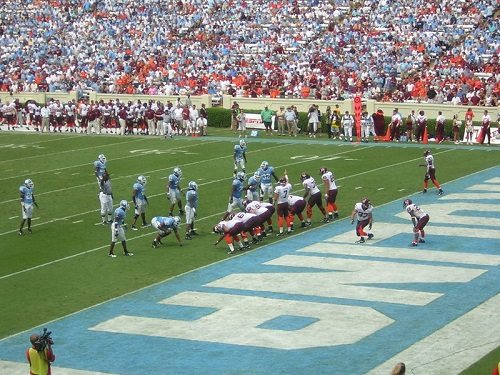
October 23, 2014;International Business Times
Employees at the University of North Carolina were, this week, implicated in a cheating scandal that has spanned nearly two decades and involved 3,100 students, about half of whom were student athletes.
Allegedly, students had been enrolled in “paper classes” that had no required attendance and no faculty involvement. The only assignment students received for the course was a research paper graded by a non-faculty member. In these classes, the average GPA was 3.61. In other classes, the average for the same students was 1.917.
“In the case of 329 students, the grade they received in a paper class provided the GPA boost that either kept or pushed their GPA above the 2.0 level for a semester,” a report released by the university on Wednesday said. Of those students, 169 were athletes: 123 football players, 15 men’s basketball players, eight women’s basketball players, and 26 athletes from other sports.
Sign up for our free newsletters
Subscribe to NPQ's newsletters to have our top stories delivered directly to your inbox.
By signing up, you agree to our privacy policy and terms of use, and to receive messages from NPQ and our partners.
The repercussions of the scandal could cause the National Collegiate Athletic Association (NCAA) to force the University of North Carolina (UNC) to forfeit wins or give out fewer scholarships.
The UNC incident at UNC isn’t the first academic scandal involving student athletes. According to USA Today, in 1999, former Minnesota academic advisor Jan Gangelhoff admitted to writing over 400 papers for at least 20 basketball players. In 2001, former Georgia basketball head coach Jim Harrick and his son were caught paying players’ expenses and providing higher grades to athletes in classes they rarely attended. In 2013, former Oklahoma State players accused the school of several NCAA violations involving student benefits, academic fraud, drugs, and sex. BusinessWeek has also reported on eleven additional academic scandals involving student athletes.
The NCAA mission statement, according to President Mark Emmert, is “to be an integral part of higher education and to focus on the development of our student-athletes.” As reported by Fox Sports, all of the promotional material that the NCAA puts out reinforces that academics should be the foundation of a college athlete’s experience.
The question becomes whether or not student athletes are held to a different standard than that of non-athletic students. A New York Times blog post opined, “When colleges lower standards of academic excellence in order to increase standards of athletic excellence, they implicitly support the popular marginalization of the intellectual enterprise.”
When the NCAA makes the determination on a disciplinary action, if any, that UNC will face, it will set precedent for all academic institutions and give insight into how diligently universities should monitor the academic standards for student athletes. The focus of the results will not only determine the consequences for UNC, but ideally will prevent similar circumstances from occurring anywhere else.—Erin Lamb












